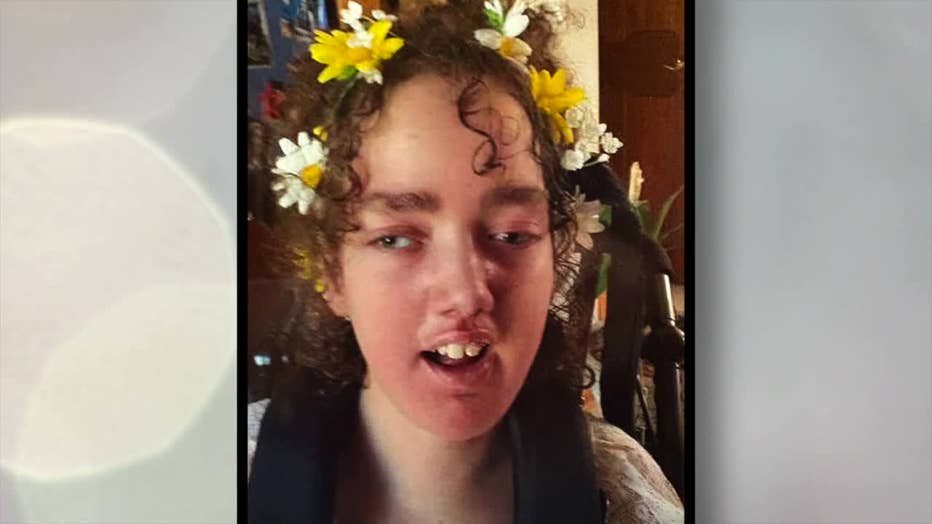Donated brain thrown out, family sues Children's Wisconsin

Children's Wisconsin
WAUWATOSA, Wis. - Children's Wisconsin said it accidentally "discarded" the frozen portion of a young woman's donated brain. Hours after the FOX6 investigation aired, that young woman's family filed a lawsuit against the hospital.
Lawsuit filed
What they're saying:
The 12-page complaint accuses Children's Wisconsin of breaching its fiduciary duty to treat Ashtyn Fellenz's brain in good faith by completing the organ transfer.
FREE DOWNLOAD: Get breaking news alerts in the FOX LOCAL Mobile app for iOS or Android
The lawsuit claims the loss of Fellenz's brain has caused the family both physical and mental anguish, and it says it has caused "a profound and irreversible loss to the fields of neuroscience, gene therapy and rare disease research."
The family is seeking both compensatory and punitive damages.
Brain ‘discarded’
The backstory:
Fellenz was diagnosed with Canavan Disease, a rare genetic disorder that causes degeneration of the protective coating around nerves and a loss of white matter in the brain.
Children with Canavan progressively lose the ability to use their muscles and become trapped inside their own bodies, like a living rag doll. Without intervention, most children with the disease die before age 10.
SIGN UP TODAY: Get daily headlines, breaking news emails from FOX6 News
In 2003, she underwent pioneering surgery to inject a functional gene into her brain in hopes of replacing the defective one. The experimental gene therapy did not cure the disease, but Dr. Paola Leone – the researcher who had requested the brain be preserved – said it improved her quality of life and helped her survive until age 24.
Fellenz was one of 16 children to get the experimental treatment, but Leone said she is one of the rare Canavan patients to have died under optimal circumstances for preserving her brain.

Ashtyn Fellenz died on December 5, 2024, at age 24
The dry ice was waiting when the 24-year-old died last year. Fellenz was already at Children's Wisconsin where a pathologist was prepared to carefully extract her brain and preserve it for future research.
By all accounts, the extraction of Fellenz's brain was flawless. It was separated into hemispheres – half of it chemically fixated in a formalin solution, the other half segmented and rapidly frozen. The plan was to quickly ship both halves to a Living BioBank at Children's Hospital in Dayton, Ohio. Instead, the tissue sat in a Children's Wisconsin laboratory for months.
Eventually, after internal administrative changes and a laboratory move, hospital officials discovered the frozen half of Ashtyn's brain had been accidentally "discarded."
Children's Wisconsin
The other side:
Children's Wisconsin declined a request for an on-camera interview. In a statement emailed to FOX6 Investigators, a spokesperson wrote:
"We were honored to support Ashtyn’s family’s wish for her legacy to help others. As we communicated to the family when this error was discovered, and reiterate now, our team is profoundly sorry this happened, and we continue to take steps to reinforce our protocols to help ensure this does not occur again. The availability of human tissue to support life-changing and lifesaving medical research is critical to offering hope to families. We take seriously our work to support research through proper tissue collection, storage and usage. We are deeply grateful for Ashtyn’s life and for her family’s advocacy and care, and again offer our most sincere regret and apology."
After receiving the statement, FOX6 Investigators submitted 16 written questions to Children's Wisconsin seeking further details. The hospital responded with this:
"As this situation is under the threat of litigation, and due to patient privacy matters, we are unable to respond in detail to many of your questions. We share the following in the hope it provides additional context:
- We have comprehensive processes in place to properly manage tissue donated for research purposes. Aspects of those processes were not followed, which caused this error.
- We realized this error as the sample was being prepared for shipment. While one portion of the tissue remained, it became apparent that the separate frozen portion of the tissue was erroneously disposed of.
- To your question regarding timing, it appears several matters created the gap in time from when the autopsy occurred to when the tissue was approved for shipment (which is when we realized a portion was accidentally disposed of). Those factors included time needed to secure and review correct consent forms from the receiving institution, the move of the lab and various scheduling matters.
- The change in lab leadership had no bearing on this matter.
- None of the above is an excuse for the remaining tissue sample being accidentally disposed of and for the delay in realizing and communicating this error.
- We have taken several specific steps to learn from this, including:The team has participated in re-education on our processes.This matter is being prioritized as it proceeds through our internal quality review process.Should the quality review process identify other areas for improvement, we will address those improvements with the seriousness they deserve.
- The team has participated in re-education on our processes.
- This matter is being prioritized as it proceeds through our internal quality review process.
- Should the quality review process identify other areas for improvement, we will address those improvements with the seriousness they deserve.
- This was a very unique situation. We cannot recall any previous situation where organ tissue donated for medical research was erroneously discarded."
The Source: For this story, FOX6 Investigators relied on interviews with Arlo and Scott Fellenz, Dr. Paola Leone and email communications with Children's Wisconsin. In addition, we reviewed emails between Dr. Leone and Children's Wisconsin provided by Dr. Leone, as well as a copy of the protocol for Ashtyn's brain removal produced by and provided to FOX6 by Dr. Leone. Much of the video used in the story comes from the FOX6 News archives in 2003, when Ashtyn Fellenz was the subject of news stories about her gene therapy surgery. We also used video provided to FOX6 News by the Fellenz family, including home videos taken at a New Jersey hospital in 2003.



